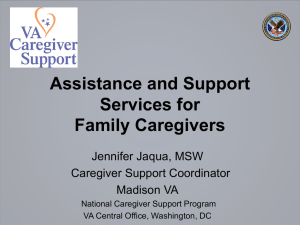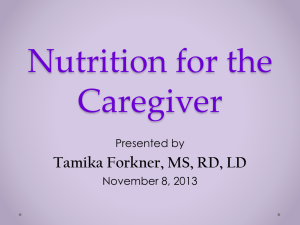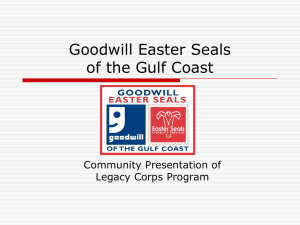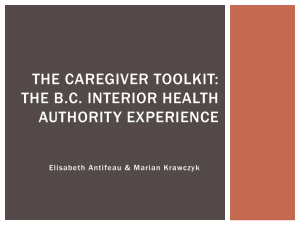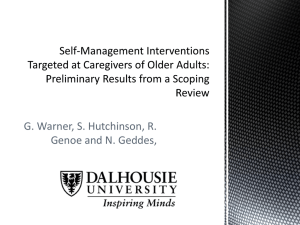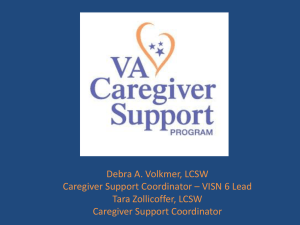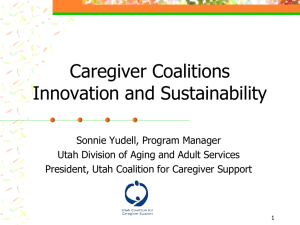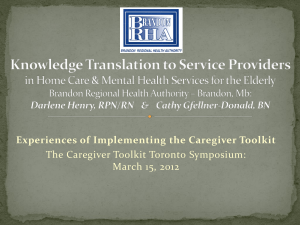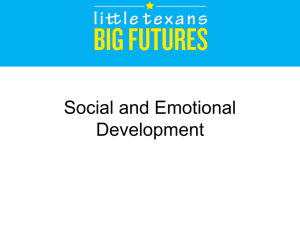Michael Kilmer, Department of Veterans Affairs
advertisement
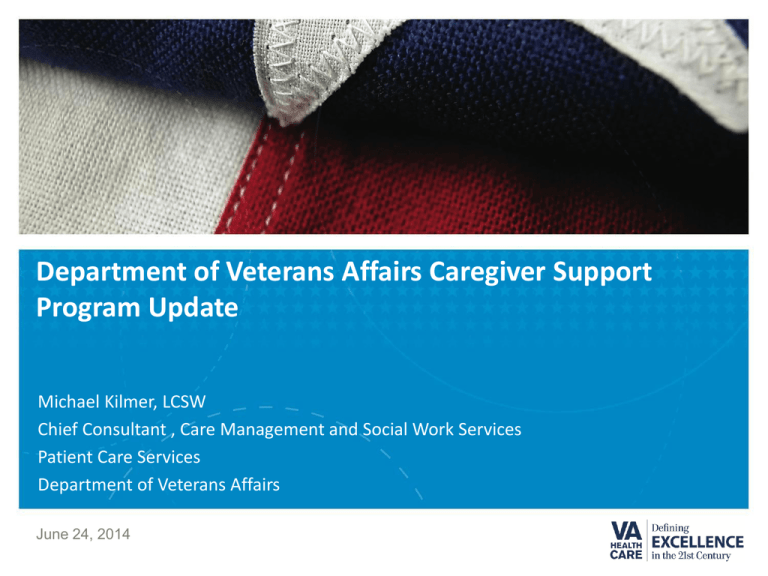
Department of Veterans Affairs Caregiver Support Program Update Michael Kilmer, LCSW Chief Consultant , Care Management and Social Work Services Patient Care Services Department of Veterans Affairs June 24, 2014 Caregiver Support Program Mission Statement: To promote the health and well-being of family Caregivers who care for our nation’s Veterans, through education, resources, support, and services. – Allow Veterans to remain at home in the community – Address specific needs of Family Caregivers with a menu of programs and services – Promote Veteran & Caregiver health and well-being – Provide one location to obtain needed information – Provide training & information on common conditions – Reduce isolation with professional & peer support – Provide options to give Caregivers respite – Sensitize health care providers to the Caregivers’ role VETERANS HEALTH ADMINISTRATION 2 Menu of VA Services to Support Family Caregivers In-Home Care Caregiver Support Skilled Nursing Support Groups Home Health Aide Caregiver Support Coordinators Home Based Primary Care Peer Support Mentoring Program Veteran Directed Home & Building Better CaregiversTM Community Based Care Respite Care Services to Address Mobility Issues Equipment Home Modification Automobile Modification Education and Training Core Curriculum Self-Care Courses Financial Support Aid and Attendance Caregiver Stipend (Post 9-11) Information and Referral Caregiver Web site: www.caregiver.va.gov Caregiver Support Line: 1-855-260-3274 VETERANS HEALTH ADMINISTRATION 3 Caregiver Support Coordinators • • • • • • • • At all VA Medical Centers Clinical experts on Caregiver issues Knowledgeable about VA and non-VA resources Assist with application for new benefits Organize Caregiver focused activities and services Ensure Caregiver sensitivity is integrated into all programs Provide National Caregiver Support Line follow-up Establish programming for National Family Caregiver Month in November VETERANS HEALTH ADMINISTRATION 4 Caregiver Education, Training, and Support Expanding Evidence-Based Interventions & Best Practices Resources to Enhance All Caregivers Health VA (REACH VA) – Designed to provide education support, and teach problem-solving for Caregivers of Veterans with Alzheimer’s Disease/dementia – Currently being expanded to Spinal Cord Injury /Disease, Multiple Sclerosis, and Mental Health Spouse /Caregiver Telephone Support – Groups of Post 9/11 spouses meet with a VA clinician to learn problem solving skills, resiliency training, and to receive support – Currently being expanding to broader audience Building Better CaregiversTM – An interactive, web based workshop developed by Stanford University and provided in partnership with the National Council on Aging (NCoA) Peer Support Mentoring Program – New Caregivers are matched to more experienced Caregivers VETERANS HEALTH ADMINISTRATION 5 Caregiver Outreach Caregiver Support Line • More than 130,000 calls received • Averaging ~ 200 calls per day Caregiver Website • List serve members = 38,000+ • Average visits per day = 830 • Pages viewed per visits = 3 www.caregiver.va.gov VETERANS HEALTH ADMINISTRATION 6 Program of Comprehensive Assistance for Family Caregivers - Eligibility Criteria Overview Veteran or Servicemember undergoing medical discharge incurred or aggravated a serious injury in the line of duty on or after September 11, 2001 (includes Traumatic Brain Injury, psychological trauma or other mental disorders). and Veteran or Servicemember requires on-going assistance from a Caregiver for a minimum of 6 months to: 1. Assist with the management of personal care functions required in everyday living; 2. Significantly enhance the Veteran’s or Servicemember’s ability to live at home safely; and 3. Support the Veteran or Servicemember’s potential progress in rehab. VETERANS HEALTH ADMINISTRATION 7 Program of Comprehensive Assistance for Family Caregivers - Eligibility Criteria Overview (contd.) and The serious injury requires another person (a Caregiver) to assist the Veteran with the management of personal care functions required in everyday living because of one or both of the following: – An inability to perform one or more Activities of Daily Living including dressing and undressing, personal hygiene, grooming, toileting, feeding oneself, mobility, or a frequent need of adjustment of a prosthetic or orthopedic appliance – A need for supervision, protection, or assistance based on symptoms or other impairments or injury including seizures, difficulty with planning and organizing, safety risks, difficulty with sleep regulation, delusions or hallucinations, difficulty with recent memory, or difficulty with self-regulation **Note: there are additional criteria beyond what is listed here. VETERANS HEALTH ADMINISTRATION 8 Primary Family Caregiver Supports and Services • Stipend – Direct payment to primary Family Caregiver – Centrally funded and managed – Based on wages of a home health aide in the geographic area where the Veteran resides – Tiered based on amount and degree of personal care services provided • Health Insurance – Civilian Health and Medical Program VA (CHAMPVA) • Travel and Lodging – Integrate into existing programs • Mental Health Services – Individual/Group psychotherapy and counseling – VA or by contract VETERANS HEALTH ADMINISTRATION 9 Program of Comprehensive Assistance for Family Caregivers Update* • Applications filed: 31,130 • Approved Applications: 15,900 – Tier 3 – 6,121 (national average $2,320 per month) – Tier 2 – 6,078 (national average $1,470 per month) – Tier 1 – 3,701 (national average $610 per month) • New Healthcare Coverage enrollees: 4,115 • Veteran Demographics: – 26% are Service Connected for TBI – 70% are Service Connected for PTSD VETERANS HEALTH ADMINISTRATION *Data from May 9, 2011 to June 9, 2014 10 Program of Comprehensive Assistance for Family Caregivers Caregiver Education and Training Standardized Core Curriculum • Developed in collaboration with Easter Seals • In-person, workbook/DVD, or web-based • Includes modules on: Caregiver Self-Care Home Safety Basic Caregiver Skills (vital signs, etc) Providing Personal Care Managing Challenging Behaviors Resources (legal, financial, VA, community, advocacy) Training Data Update: • More than 20,000 Family Caregivers have completed training to date VETERANS HEALTH ADMINISTRATION 11

